The Centre has started extensive public consultations on draft rules for online gaming which were published last month
Revisiting the definition of online games, age-appropriate certification for games, and wider scope for the SRO are among the suggestions received during the consultations
Chandrasekhar also assured that the SRO will have equitable representation of all industry stakeholders
Inc42 Daily Brief
Stay Ahead With Daily News & Analysis on India’s Tech & Startup Economy
The government will not allow the industry to take complete control of the proposed self-regulatory body for online gaming, Union Minister of State for Electronics and IT Rajeev Chandrasekhar has said.
“We are going by the principle of accountability and transparency. The government will certainly not allow the industry to hijack the SRO,” the minister said.
Chandrasekhar also said that the government is committed to the growth of online gaming while at the same time safeguarding digital citizens with the new rules.
The Centre has started extensive public consultations on the draft rules for online gaming, which were published last month. On Wednesday, it held the first set of discussions with key stakeholders, parents, students and educationists, news agency PTI reported.
During the meeting, some of the educators urged the minister to ensure that the proposed self regulatory body “operates at an arm’s length” from the industry. They also urged to frame an ‘objective criteria’ so that the process is not abused by the industry.
The minister assured that the SRO will have equitable representation of all industry stakeholders.
“Gamer representatives there hold as much importance and sway on SRO’s conduct as does the NCPCR representative or the NCW representative or gaming industry representative or the government representative,” Chandrasekhar said.
Revisiting the definition of online games, age-appropriate certification for online games, and a wider scope for the SRO were among the suggestions received during the consultations.
Priyank Kanoongo, chairperson of the National Commission for Protection Of Child Rights (NCPCR), suggested that the government should consider involving prominent institutions or country’s top psychiatric institutes while forming the SRO.
The Ministry of Electronics and Information Technology (MeitY) has proposed a self-regulatory mechanism for online gaming companies in the draft online gaming rules.
“Self-regulatory bodies will be registered with the ministry and may register online games of such online gaming intermediaries who are its members and which meet certain criteria. Such bodies will also resolve complaints through a grievance redressal mechanism,” the ministry said.
The government is reportedly also working on new rules to limit the amount of time children spend on a gaming app. Under the upcoming provisions, gaming companies may need to submit anonymised reports on usage by children. The new rules may come under the upcoming Digital India Act.
The Indian gaming startup ecosystem, which has produced unicorns like Dream11, MPL, and Games24X7, saw a sharp 80% decline in funding in 2022 due to the regulatory uncertainty and macroeconomic headwinds. Indian gaming startups raised just $349 Mn in 2022 as compared to $1.74 Bn in 2021.
Meanwhile, the number of gamers in the country rose 12% to 507 Mn by March 2022 (24% were paying users) from 450 Mn in March 2021, according to a report by gaming and interactive media-focused VC fund Lumikai.
{{#name}}{{name}}{{/name}}{{^name}}-{{/name}}
{{#description}}{{description}}...{{/description}}{{^description}}-{{/description}}
Note: We at Inc42 take our ethics very seriously. More information about it can be found here.


